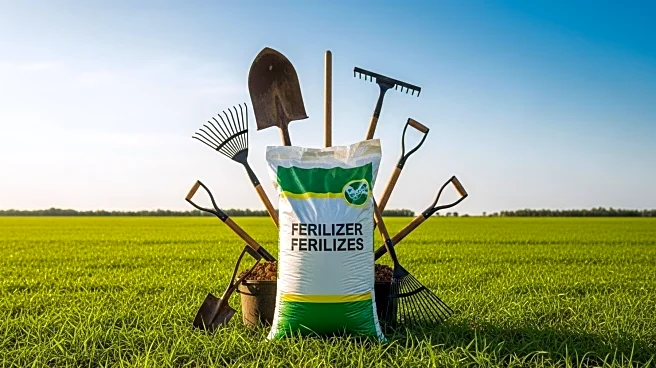What is the story about?
What's Happening?
Brazil is experiencing an increase in fertilizer prices due to geopolitical tensions, higher freight costs, and a heavy reliance on imports. Despite these challenges, demand for fertilizers is expected to remain stable as farmers prioritize soil fertility and seek more affordable domestic alternatives. Felipe Coutas, president of Itafos in Brazil, highlights the factors contributing to price increases, including international conflicts affecting maritime freight and supply chains. Brazil's dependence on imports makes it vulnerable to exchange rate fluctuations and global conditions. The National Fertilizer Plan aims to reduce this dependency, but requires significant investment and regulatory predictability. The sector faces logistical challenges, with a high reliance on road transport, which increases costs and risks of shortages.
Why It's Important?
The rising fertilizer prices in Brazil have significant implications for the agricultural sector, which is crucial for the country's economy. As Brazil is a major global agricultural producer, increased costs could affect competitiveness and profitability for farmers. The reliance on imports exposes the sector to international market fluctuations, potentially impacting food security and economic stability. Efforts to strengthen local production and reduce import dependency are vital for enhancing national sovereignty over strategic inputs. The situation underscores the need for investment in infrastructure and logistics to improve efficiency and reduce costs, which could benefit the broader agribusiness sector.
What's Next?
Brazil's National Fertilizer Plan aims to reduce dependency on imports by encouraging local production and improving logistics. This requires substantial investment and regulatory support to ensure legal certainty and access to competitive inputs. The sector may see increased investment in rail transport and vertical integration to enhance logistical efficiency. Additionally, the growing demand for inputs from the battery industry could create competition, necessitating strategic planning to avoid bottlenecks. The government and industry stakeholders must collaborate to implement long-term strategies that support sustainable growth and resilience against global shocks.
Beyond the Headlines
The fertilizer sector's challenges highlight broader issues of economic vulnerability and the need for diversification in Brazil's agricultural inputs. The geopolitical tensions affecting prices also reflect the interconnectedness of global supply chains and the impact of international conflicts on domestic markets. The focus on local production aligns with sustainability goals, offering opportunities for innovation and environmental stewardship. The situation may drive policy changes and investments that could reshape Brazil's agricultural landscape, promoting resilience and self-sufficiency.














